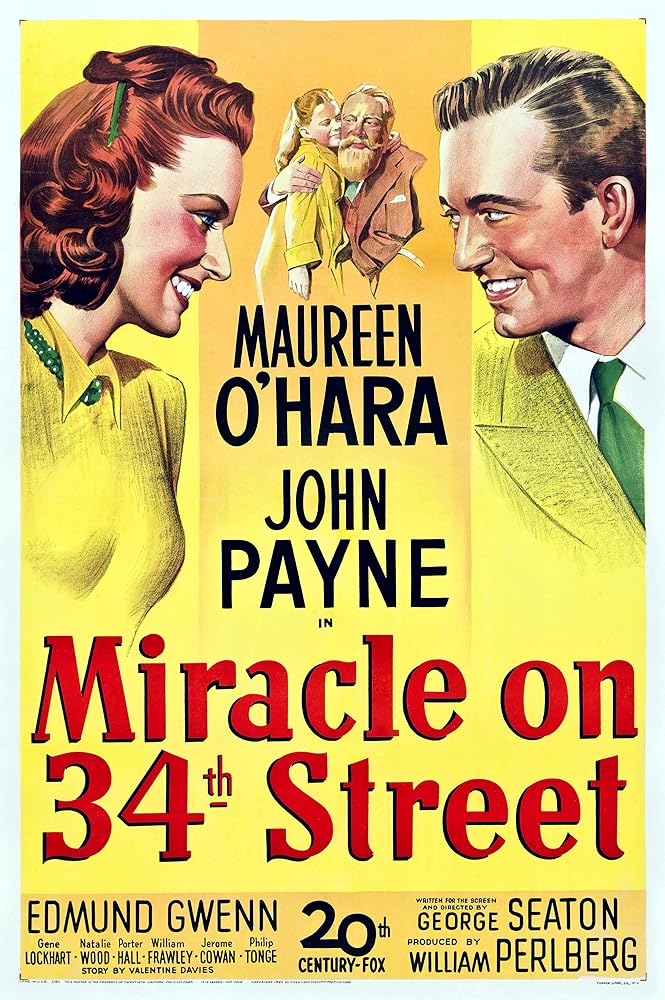
MIRACLE ON 34TH STREET
(director/writer: George Seaton; screenwriter: based on a story by Valentine Davies/Valentine Davies; cinematographers: Lloyd Ahern/Charles Clarke; editor: Robert Simpson; music: Cyril Mockridge; cast: Maureen O’Hara (Doris Walker), John Payne (Fred Gailey), Edmund Gwenn (Kris Kringle), Natalie Wood (Susan Walker), Harry Antrim (R.H. Macy), Jerome Cowan (D.A. Thomas Mara), Gene Lockhart (Judge Henry X. Harper), Philip Tonge (Mr. Shellhammer), James Seay (Dr. Pierce), Alvin Greenman (Alfred), Porter Hall (Mr. Sawyer), William Frawley (Political Boss, Charles Halloran), Thelma Ritter (Peter’s Mother), Anthony Sydes (Peter), Jack Albertson (Post Office Worker); Runtime: 97; MPAA Rating: NR; producer: William Perlberg; 20th Century Fox; 1947)
“A charmer.”
Reviewed by Dennis Schwartz
A charmer filled to the brim with easy to take sentimentalism. George Seaton directs and co-writes this competent comedy fantasy, a film based on the story by Valentine Davies and shot in black and white. It’s an American classic perennially shown on TV during the Christmas season, though far from perfect (many dull spots in the middle) it locks in on something yearned for by the public that is wholesome and delivers what it promises in an enjoyable manner. It won Oscars for Edmund Gwenn as Supporting Actor and for Seaton as screenwriter. It also marked the screen debut of Thelma Ritter in a fleeting minor part as a beleaguered housewife.
Warning: spoilers in the next two paragraphs.
At Macy’s annual Thanksgiving Day Parade an intoxicated Santa Claus is replaced on the spot by parade head Doris Walker (O’Hara) with a kindly old man who has a real white beard and calls himself Kris Kringle (Gwenn). When hired to be the department store Santa, he scares boss Doris by claiming to be the real Santa Claus. This gives the divorced workaholic supervisor Doris fits, as she has a very smart second grade daughter Susan (Wood) who was told not to believe in Santa or fairy tales. When handsome bachelor lawyer Fred Gailey (Payne), a neighbor of Doris’, befriends cutey pie Susan, he questions mom’s judgment and brings Susan to Macy’s to meet Kris Kringle. Susan is won over by Santa singing in Dutch a song to a frightened Dutch orphan and doesn’t know who to believe, anymore. Meanwhile Kris Kringle is concerned the holiday has become too commercial and does his best to instill the true spirit of Christmas, as he ignores the toy department head’s (Tonge) advice to push unwanted toys on the children. He instead sends customers to other department stores if appropriate, and this policy catches on with the public. Mr. Macy calls it a smart good will policy that places public service over profits, which works to make more profits. Soon rival Gimbels follows suit. But when Kris Kringle insists he’s the real Santa Claus, Doris has him examined by the incompetent store psychologist (Hall) who finds him insane. Afraid to take a chance, Doris checks further and learns from his work application that he’s residing in a nursing home in Great Neck, Long Island. The doctor at the home, Dr. Pierce, informs Doris that he’s not insane but a harmless kindly soul who wouldn’t hurt anyone but is delusional, and recommends keeping him as Santa. But Doris becomes afraid that if he’s really nuts she’ll take the fall and agrees to have psychiatrists from Bellevue Hospital examine him. They declare him insane and want to commit him to their mental institution. But at a court hearing Gailey, who has let Kris move in with him while he’s working at the Manhattan store, decides to act as Kris’s lawyer. Gailey gets good publicity from the newspapers, who vilify the prosecutor (Cowan) for going after such a kind-hearted Santa.
It takes a formal court proceeding to prove if Kris is sane for believing he’s Santa Claus, where Gailey lucks out and actually proves he’s Santa by some clever script writing ploys. The trial acts to make a case for having faith and being a believer, as little Susan learns to use her imagination when playing with friends and acts like a little girl should by once again believing in Santa. Her mother loses her cynicism and welcomes the true love offered by Gailey in a fairy tale ending, and the public is pleased with the message of generosity and the forsaking of commercialism and welcomes the court verdict. The happy ending which comes right before Christmas Eve seems justified, as everyone gets what they want in the spirit of Christmas.
Edward Gwenn is convincing as Kris Kringle, giving an affectionately heart-rendering and memorable performance, while Natalie Wood is so adorable and sweet she can melt even the most blackened disbeliever’s heart.
REVIEWED ON 12/27/2003 GRADE: B https://dennisschwartzreviews.com/